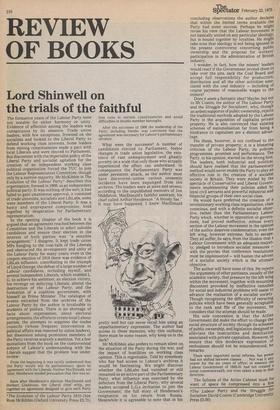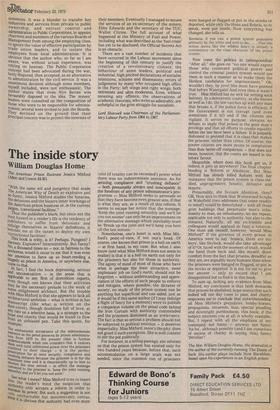Lord Shinwell on the trials of the faithful
The formative years of the Labour Party were not notable for either harmony or unity. Evidence of affection among the leaders was conspicuous by its absence. Trade union leaders, with few exceptions, frowned on the socialists and looked to the Liberal Party to defend working class interests. Some leaders from mining constituencies made a pact with local Liberals and were elected to Parliament. But discontent with the imperialist policy of the Liberal Party and socialist agitation for the creation of an independent working class political organisation forced the TUC to join the Labour Representation Committee, though only by a narrow majority. Mr McKibbin in The Evolution of the Labour Party* describes this organisation, formed in 1900, as an independent political party. It was nothing of the sort; it had failed to gain unanimous approval, it consisted of trade unionists, socialists and LibLabs, some were members of the Liberal Party. It was a hasty and unprepared compromise, held together by desperation for Parliamentary representation.
In the opening chapter of the book it is argued that an agreement reached between the Committee and the Liberals to select suitable candidates and ensure their election in the interest of both parties was "a sensible arrangement." I disagree. It kept trade union MPs hanging to the coat-tails of the Liberals and obstructed the development and unity of the Labour Party for many years; even in the coupon election of 1918 there was evidence of LibLab influence, contributing to the triumph of Lloyd George, the defeat of a large number of Labour candidates, including myself, and several independent Liberals, which enabled L. G. to achieve his ambition; an election victory, his revenge on defecting Liberals, almost the destruction of the Labour Party, and the formation of a coalition government, with himself as Prime Minister. The catalogue of events extracted from the archives of the Labour Party by the author is invaluable to students of politics. There is no shortage of facts about organisation, about electoral arrangements, the efforts to create local Labour parties, the attempts to suppress the trades councils (whose frequent intervention in political affairs was resented by union leaders), but dissension among prominent members of the Party receives scarcely a mention. Yet a few quotations from the book on the controversial subject of Labour's understanding with the Liberals suggest that the problem was under review:
From the beginning it was tacitly understood that the Party would win its parliamentary spurs by agreement with the Liberals. Neither MacDonald, nor later, Henderson needed persuasion that this was so.
Soon after Henderson's election MacDonald and Herbert Gladstone, the Liberal chief whip, put together an agreement designed to give each Party The Evolution of the Labour Party 1910-1924, Ross McKibbin (Oxford University Press £5.75) free runs in certain constituencies and avoid difficulties in double-member boroughs.
After the successes of 1906 the leadership of the Party, including Hardie, was convinced that the agreement was necessary for Labour's parliamentary advance.
What were the successes? A number of candidates elected to Parliament, feeble changes in trade union legislation, the existence of vast unemployment and ghastly poverty on a scale that only those who actually experienced the effect can understand. In consequence the Parliamentary Party was under persistent attack, as the author must have discovered—unless various unseemly incidents have been expunged from the archives. The leaders were at sixes and sevens; according to the unpublished memoirs of Jim Middleton, MacDonald's faithful assistant, his chief called Arthur Henderson "A bloody liar." It may have happened. I knew MacDonald pretty well but can never recall him using an unparliamentary expression. The author had access to these memoirs; why -this outburst, there must be some reason, why keep us in the dark?
Mr McKibbin also prefers to remain silent on, the situation of the Party during the war, and' the impact of hostilities on working class opinion. This is regrettable. Told by somebody who has had access to Labour's archives it would be fascinating. We might discover whether the LibLabs had vanished or still remained as an active part of the Parliamentary Party, what influence was exercised by the defectors from the Liberal Party, why several leaders accepted L.G.s invitation to join the Government; the full story of Henderson's resignation on his return from Russia. Meanwhile it is agreeable to note that in his concluding observations the author declares that within the limited terms available the Party had some success. Perhaps he might
revise his view that the Labour movement is not basically united on any particular ideology,
but is bound together by loyalties. He might take note that ideology is not being ignored in the present controversy concerning public ownership and the proposal for workers' participation in the administration of British industry. I wonder, in fact, how the miners' leaders would react if the Government invited them to take over the pits, sack the Coal Board and
accept full responsibility for production, distribution and all the other activities asso ciated with the coal industry — including of cow-se payment of reasonable wages to the miners?
Does it seem a fantastic idea? Maybe, but not to Mr Coates, the author of The Labour Party and the Struggle for Socialismt who, though
an ardent supporter of public ownership, rejects the traditional methods adopted by the Labour Party in the acquisition of capitalist private property. He is also convinced that existing schemes of nationalisation far from being a hindrance to capitalism are a distinct advantage. His thesis, however, is not confined to the transfer of private property; it is a blistering criticism of the Labour Party, its policies, programmes, promises and performance. The Party, in his opinion, started on the wrong foot.
The leaders, both industrial and political, should have realised that the parliamentarY method would never enable the Party to play an effective role in the creation of a socialist society in Britain. They were misled by the spectacle of Conservative and Liberal Governments implementing their policies aided by loyal civil servants and powerful industrial and financial groups of their own social class.
He would have preferred the creation of a revolutionary working class organisation, class conscious, and with a definite socialist objective, rather than the Parliamentary Labour Party which, whether in opposition or government, had proved ineffective. Almost every section of the Labour movement in the opinion of the author deserves condemnation; even the left wing, however extreme, fails to escape. They all suffer, he says, from the illusion that a Labour Government with an adequate majority, pledged to introduce socialist measures — with the proviso that conference resolutions must be implemented — will hasten the advent of a socialist society which is the ultimate objective.
The author will have none of this. He rejects the arguments of other partisans, usually of the academic variety, that pressure by the left wing within the movement, together with mounting discontent provoked by ineffective remedies for social and industrial problems will assist to advance the realisation of a socialist society. Though recognising the difficulty of retracing policies which have been generally acceptable to the rank and file of the movement, he considers that the attempt should be made.
His sole concession is that the Attlee Government did make the effort to change the social structure of society through its schemes of public ownership, and legislation designed to alleviate the insecurities and destitution associated with private capitalism. However, to ensure that this moderate expression of enthusiasm should not be misunderstood, he remarks:
There were important social reforms, but power had not shifted between classes . . Nor was it anY nearer for the six years of office: in essence the Labour Government of 1945-51 had not created a social commonwealth, nor even taken a step in that direction.
The failures of the Attlee Cabinet must for want of space be compressed into a fevi
tThe Labour Party and the Struggle for Socialism David Coates (Cambridge University Press £5.00) sentences. It was a blunder to transfer key industries and set-vices from private to public ownership, and entrust control and administration to Public Corporations, to appoint chairmen and members of the various Boards of Management from among the employing class, to ignore the value of effective participation by trade union leaders, and to isolate the employees from local administration. It is obvious that the author who, so far as I am aware, was without actual experience, was relying on hearsay. The Public Corporation concept had been advocated during the war, hotly disputed, then accepted, as an alternative to administration by the civil service. It was a unanimous decision although some members, Myself included, were not enthusiastic. The author states that even Nye Bevan was favourably disposed to the idea. The miners' leaders were consulted on the composition of those who were to be responsible for administration, several were invited to join the Boards. They declined on the ground that their Principal concern was to protect the interests of
their members. Eventually I managed to secure thd services of an ex-secretary of the miners, Ebby Edwards and the secretary of the TUC, Walter Citrine. The full account of what happened at the Ministry of Fuel and Power, including what was described as the 'fuel crisis' • has yet to be disclosed; the Official Secrets Act is an obstacle.
There are a vast number of incidents that have occurred in the Labpur movement since the beginning of this century to justify the creation of a revolutionary climate; the behaviour of some leaders, political and industrial, high pitched declarations of socialist intentions, schisms and dissensions; errors of judgement by many who occupied high office in the Party; left wings and right wings, both extremists and ultra moderates. Even, without meaning any offence, the observations of academic theorists, who write so admirably, are unhelpful in the grim struggle for socialism.
Lord Shinwell was Chairman of the Parliamentary Labour Party from 1964 to 1967



































 Previous page
Previous page